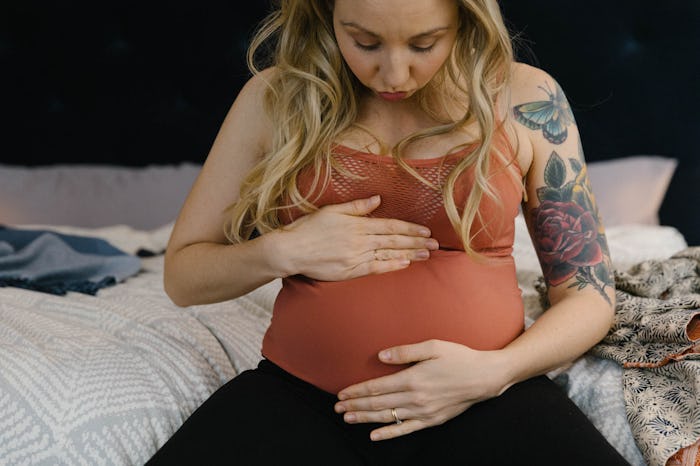Life
If You're Pregnant, Here's What To Look For If You Think You're Vitamin D Deficient
For years, every time I had my blood drawn, my vitamin D levels hovered around "vampire who's allergic to the sun." This is in spite of the fact that I am as pale as one can be without being completely translucent, and my skin should gobble up vitamin D like I do fresh jelly donuts. Alas, 'tis not the case, and it was especially bad during my pregnancy before they started me on heavier supplementation. If this is you, you might wonder what the signs of vitamin D deficiency in pregnant women happen to be, and how bad it can get.
There is a lot of research available about the risks associated with lower than optimal levels of vitamin D in pregnant women. However, the symptoms may be harder to parse out. On the whole, the symptoms of vitamin D deficiency are the same for the pregnant population as they are for everyone else, but they're exacerbated by the condition of pregnancy. Your body is using more vitamins and more energy during pregnancy, and you're in a naturally immunocompromised state, making you more susceptible to illness and disease already. Some of the symptoms follow along that pattern, according to The Journal of Endocrinology and Metabolism. They are fatigue, depression, hair loss, bone fractures, thyroid issues, slowly healing wounds, and getting sick more easily and often.
Vitamin D deficiency is one of those strange scientific phenomena that medicine knows will absolutely impact not only your health, but also the health of your unborn child, but they're not certain as to why, or even what the exact levels should be in your system, according to Harvard University. Medicine, as of the time of this publication, only understands where the low threshold is, and what damage can be done by dipping too low below that line. They don't have an exact "optimal range" like they do for vitamin A or iron.
Luckily, one of the first blood tests of pregnancy now typically includes vitamin D because of all of the data and research noting how important it is for pregnant women to have adequate levels of vitamin D in their blood, not just for the women, but also for the developing fetus. From my own experience, if your blood tests show that you have a D deficiency present in your blood, you will be put on D supplementation. According to The Journal of Endocrinology and Metabolism, the dosage prescribed is 4000 IUIs of vitamin D each day.
The signs of vitamin D deficiency in pregnant women start showing themselves early in pregnancy and continue to worsen unless the problem abates. According to the Royal College of Obstetricians and Gynaecologists (RCOG), some of these are increased levels of antenatal depression, anxiety, lethargy, high blood pressure, and decreased immune response. This means that if you are D deficient and pregnant, you are more likely to pick up every germ and bug, catching every cold, and having it last longer than it would normally.
The problems don't end there, though. According to PLoS One, women who are deficient in vitamin D are at greater risk for preterm birth, restricted birth weight, preeclampsia, and other adverse pregnancy outcomes. These are not small risks. Preeclampsia is possibly lethal to both mother and child, and the only real treatment for the condition at some point is the delivery of the child. It's a terrifying idea to think that something as seemingly insignificant as not getting enough sunlight could lead to something so dire.
According to RCOG, 30 minutes of sunlight per day, wherein your skin is exposed to the light, is enough to charge your own personal D batteries and keep everything running as it should. However, this fluctuates for people with darker skin and those who live in climates farther north, away from the sun. It's important to get tested, and to watch for the signs of vitamin D deficiency to make sure you're safe.
Check out Romper's new video series, Romper's Doula Diaries:
Watch full episodes of Romper's Doula Diaries on Facebook Watch.
